The phrase “best digital marketing agency for law firms” is highly sought because it reflects a fiercely competitive landscape, with U.S. law firms scrambling to claim attention online. As more firms invest in digital strategies, visibility becomes a prized and elusive commodity.
Rather than reducing the conversation to rankings or lists, the real value lies in unpacking what “best” truly signifies. It is the mix of strategy, results, and specialization that can transform an agency from a service provider into a growth engine for a law practice.
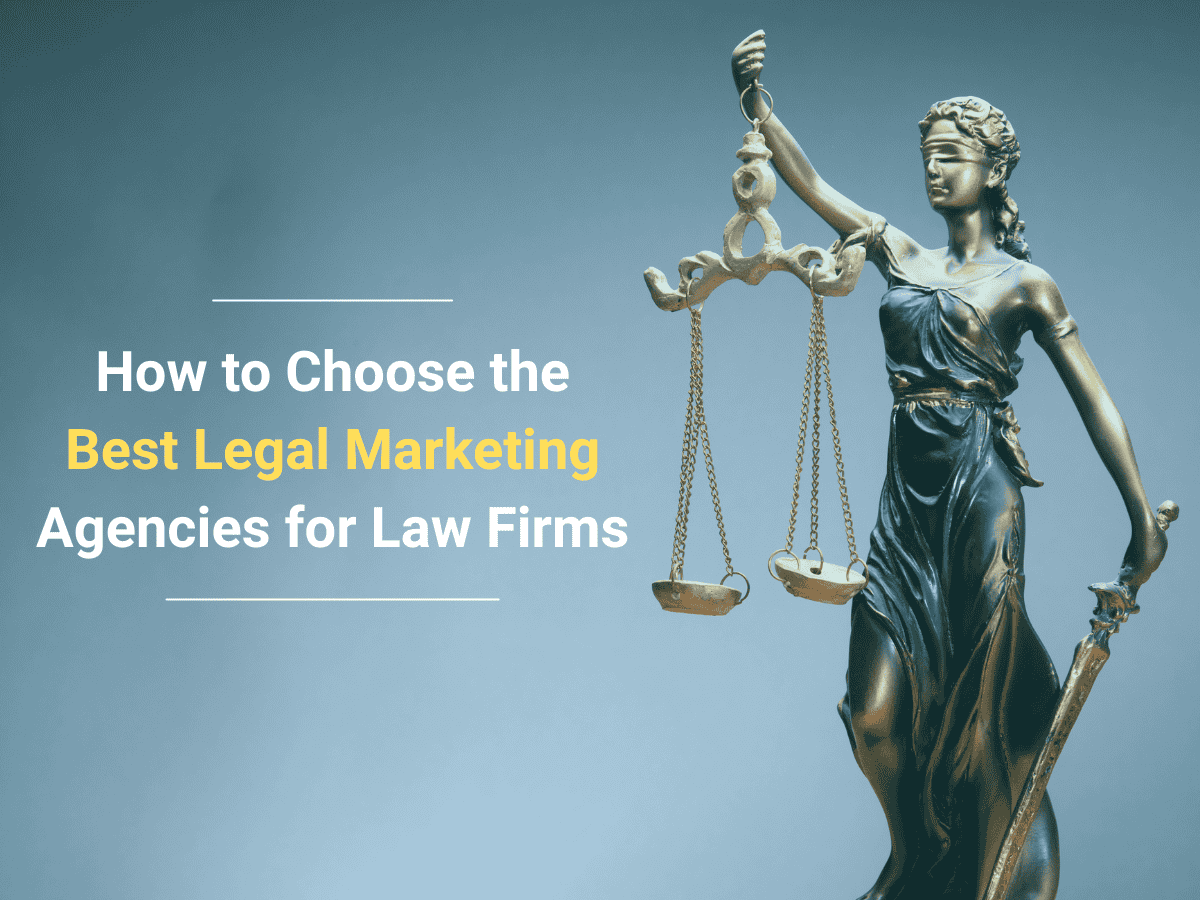
Why Digital Marketing Matters for Law Firms
In today’s digital era, marketing is important for law firms aiming to attract new clients and expand their practice. While personal referrals remain valuable, most potential clients now rely on search engines, online reviews, and legal directories to find attorneys.
Data from Clio shows that over one-third of prospects begin their attorney search online. Without a strong online presence, your firm risks being overlooked. Even referred clients often research lawyers before making contact, and a lack of reviews or a poor website can turn them away.
Modern firms compete not only locally but with countless practices online. With many investing $50,000 – $100,000 a month in paid search alone, a strategic digital marketing plan is essential for long-term growth, visibility, and credibility.
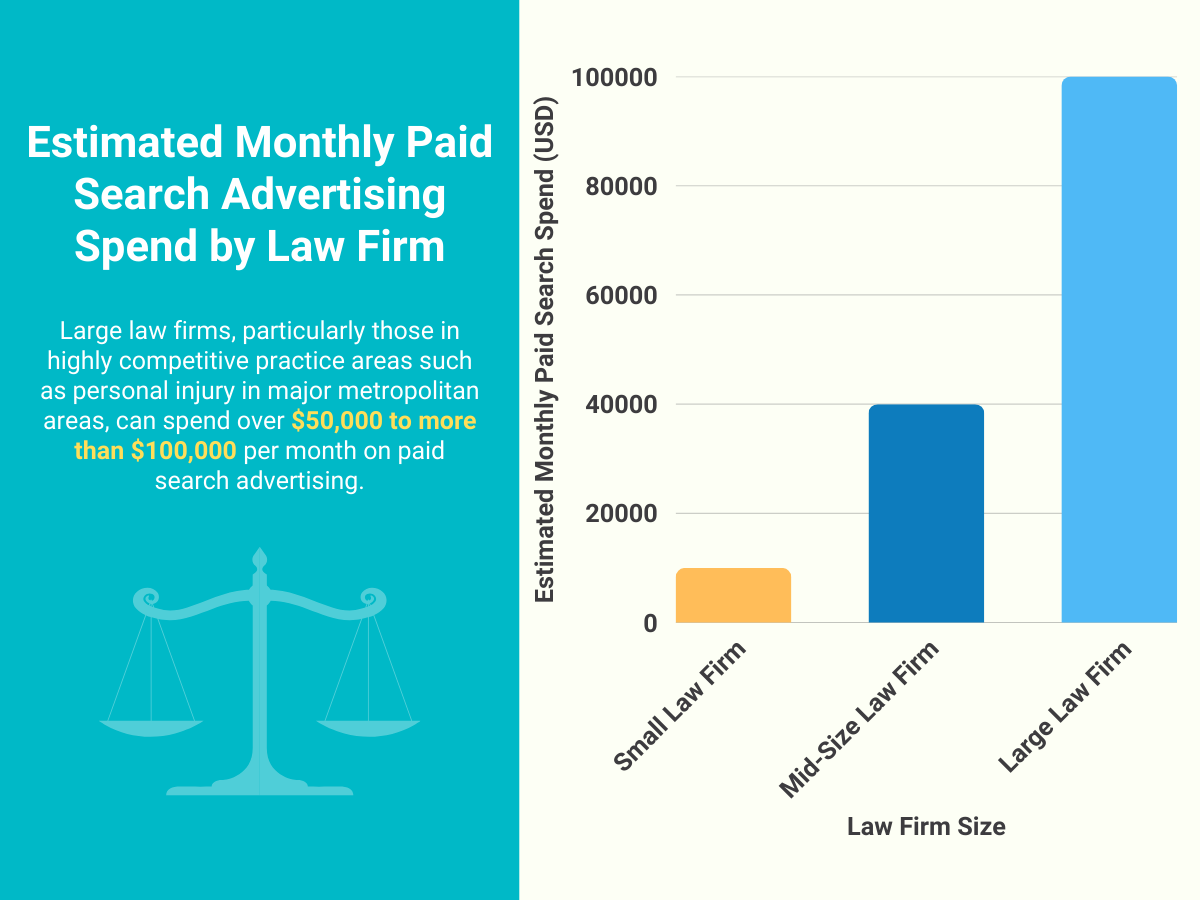
Common Marketing Challenges in the Legal Industry
Marketing is more critical than ever for law firm success, but in a conservative industry, growth requires a strategic, thoughtful approach. Despite varied challenges, six key trends consistently impact firms of all sizes:
- Compliance with Bar Association Advertising Rules: Each state’s bar association sets strict rules for lawyer advertising. Lawyers cannot make false statements or promise results, as this can cause compliance problems..
- Ethical Restrictions on Language: Words like “guarantees,” “expert,” or “best” are considered misleading if they exaggerate skills or imply unauthorized specialization.
- Handling Sensitive Content: For example, family law cases involving child custody or domestic violence demand careful wording, protection of client confidentiality, and avoidance of sensationalism.
- Misuse of Terms in Ads: Google Ads values diversity and respect and does not allow content that offends users. As stated in the Google Advertising Policies Center, ads or destinations promoting discrimination, hatred, violence, bullying, self-harm, animal cruelty, profane language, sexual exploitation of minors, or illegal sales can result in suspension of ads or your Google Business Profile (GBP)
- Highly Competitive Keywords: Pay-per-click (PPC) marketing in the legal sector faces a major hurdle due to intense keyword competition. High-demand search terms raise cost-per-click (CPC), which requires law firms to bid large amounts to have their ads appear.
- Data Privacy & Reputation Risks in Ad Remarketing: Law firms must comply with laws like the General Data Protection Regulation (GDPR) and clearly state how personal data is collected and used. Poor cybersecurity or misuse of remarketing and tracking tools can harm a firm’s reputation, breach confidentiality, and create legal liabilities.
Law firm marketing faces unique challenges due to strict ethical rules, sensitive client matters, and intense online competition. Firms must carefully navigate advertising compliance, protect client privacy, and manage high-cost digital campaigns while maintaining a trustworthy reputation.
How to Find a Digital Marketing Agency for Your Law Firm
Finding the right digital marketing agency is like navigating a maze of possibilities, where instinct meets innovation. Some routes glow with trusted referrals, others with online insights, and AI guides you to a partner who can truly amplify your firm’s digital presence.
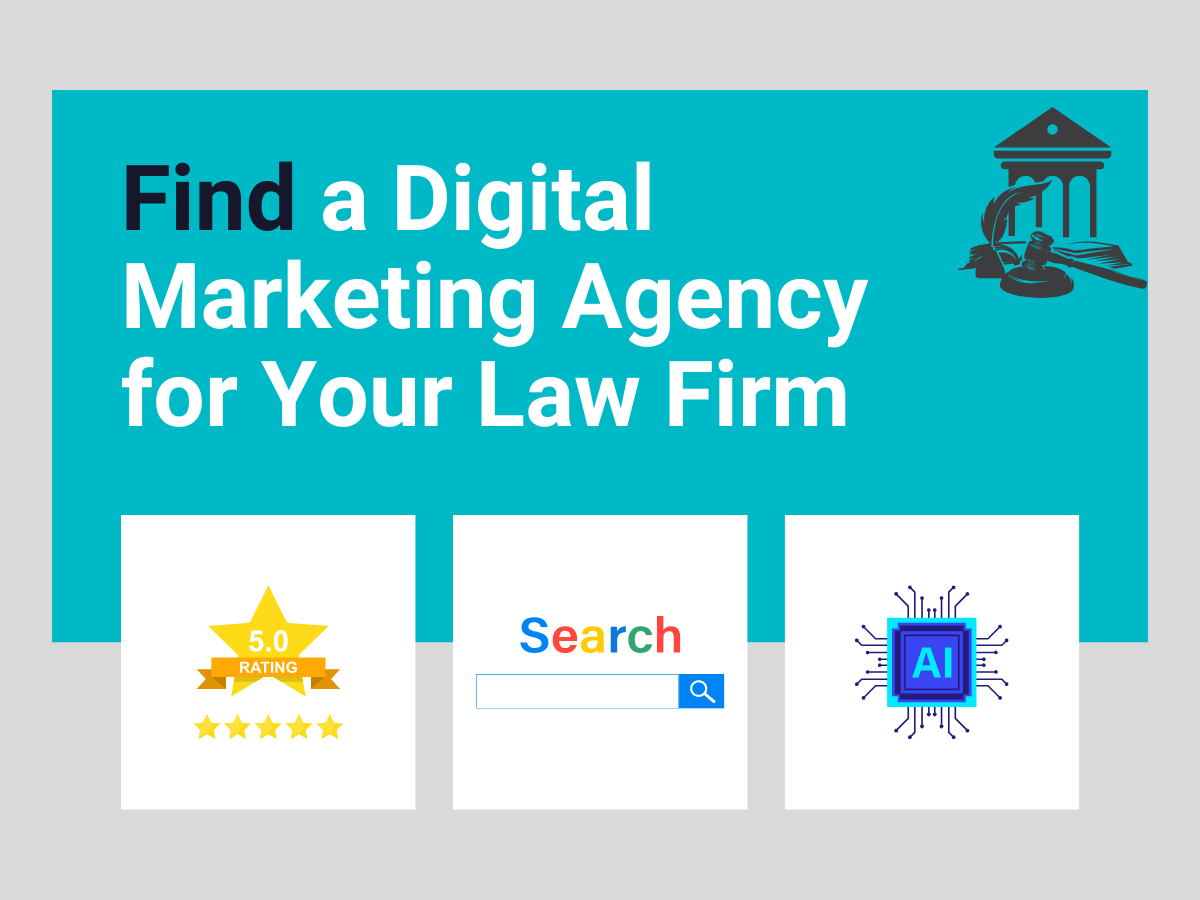
Ask for Recommendations
Asking for recommendations is one of the most effective ways to find a trusted digital marketing agency for your law firm. Reach out to colleagues, peers, or mentors within the legal community, either directly or through professional networks like LinkedIn, bar associations, or Facebook groups.
Prioritize suggestions from firms of similar size and practice areas, as they often share comparable goals, budgets, and challenges.
Search Online (Local vs. National Options)
When searching for an expert in law firm digital marketing, consider whether local collaboration or specialized expertise matters most. Local agencies offer in-person communication and insight into regional markets, while national firms often bring advanced strategies and broader legal marketing experience.
Use Google searches and review platforms like Clutch to compare agencies, assess testimonials, and check case studies showcasing results in SEO, PPC, and content marketing.
Use AI Tools for Research
AI tools offer law firms a fast and data-driven way to shortlist digital marketing agencies that specialize in legal SEO, content, and lead generation. Platforms like ChatGPT, Gemini, and Perplexity can analyze client reviews, case studies, and agency performance to provide customized recommendations.
Key Advantages:
- Efficiently distills large volumes of information into actionable insights.
- Identifies agencies with proven results in similar practice areas.
- Highlights performance metrics and campaign success.
Cautions:
- Independently verify credentials and case studies.
- Treat AI suggestions as a research starting point, not a final decision.
Tap into the power of peer recommendations, online searches, and AI tools to identify top digital marketing agencies with a proven track record in law firm success. By blending personal referrals and data-driven insights, you’ll uncover agencies that align with your firm’s goals and needs.
Where Not to Look for Legal Marketing Agencies
Knowing where not to turn for legal marketing support can save your firm from wasted time and reputational harm.
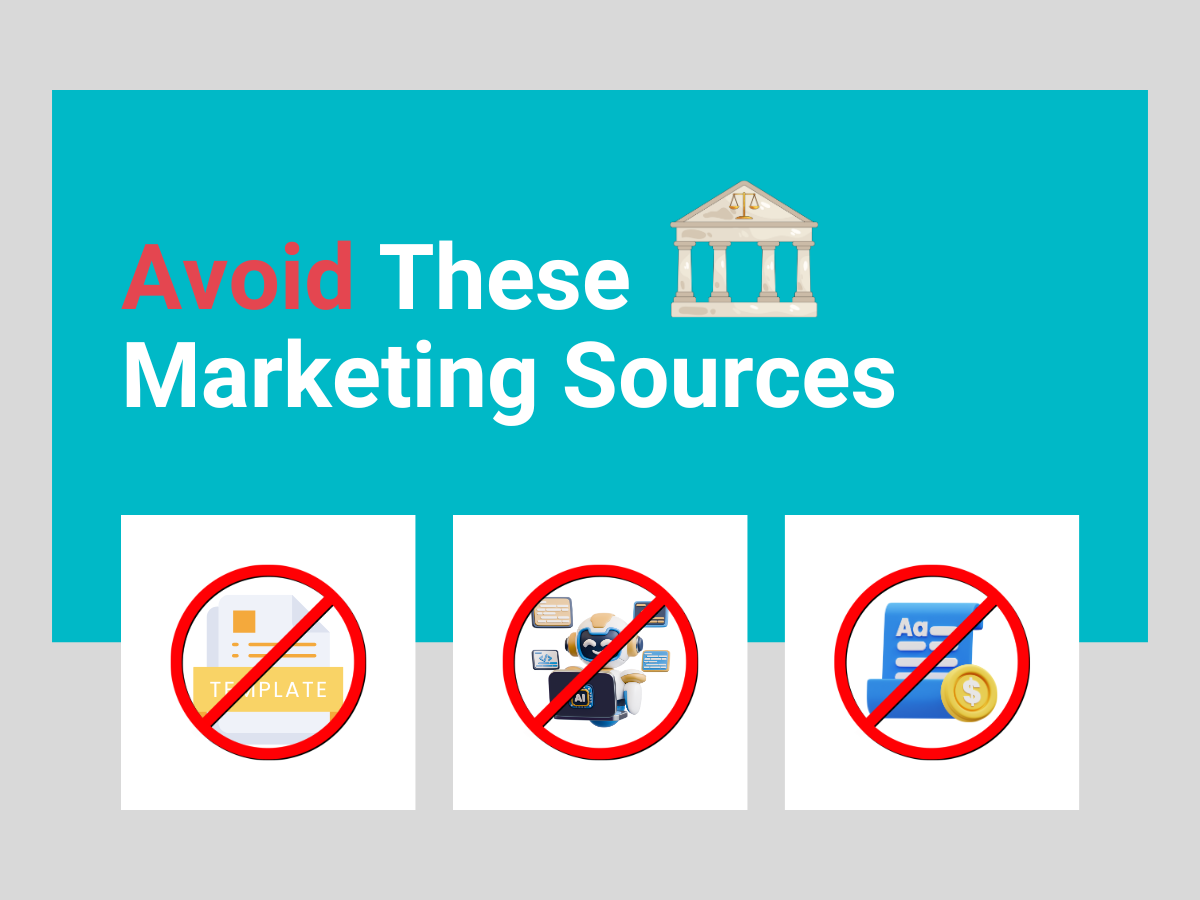
- Template-Based Marketing Providers (e.g., Martindale, GoDaddy SEO Programs): These services rely on identical website layouts and generic SEO plans that ignore a law firm’s niche, jurisdiction, and ethical boundaries.
- Agencies Relying on Generic Templates or AI-Generated Content: Marketing firms that use unedited AI or mass-produced materials frequently create inaccurate or non-compliant content. Without attorney review, posts may misrepresent legal services, breach confidentiality, or contradict professional conduct rules.
- Directories or Marketplaces Selling Paid Placements: Platforms that rank firms based on payment rather than verified expertise can mislead potential clients and distort credibility. Paid listings on low-quality directories rarely generate meaningful leads.
By avoiding these common traps, your firm can build a marketing strategy that upholds its integrity, attracts the right clients, and drives meaningful results.
How to Choose the Best Digital Marketing Agency for Your Law Firm
Partnering with a digital marketing agency for your law firm is a decision that can shape your growth and reputation. As you evaluate options, look for a partner who checks multiple boxes. The best legal marketing company possesses the following qualities and capabilities.
Legal Industry Experience
In legal marketing, every click can make a difference. The right digital marketing agency helps your firm reach the clients who matter most while keeping campaigns ethical and cost-effective.
Compliance and Ethical Considerations in Law Firm Digital Marketing
A strong law firm advertising campaign must be both creative and compliant. Ethics form the foundation of the legal profession, and marketing should always reflect that integrity.
American Bar Association Model Rules
The American Bar Association’s (ABA) Model Rules of Professional Conduct provide guidance for ethical advertising, particularly:
- Rule 7.1: Prohibits false or misleading statements.
- Rule 7.2: Regulates the sharing of information and the use of paid referrals.
- Rule 7.3: Restricts direct solicitation of prospective clients.
Law firms should avoid unverifiable claims such as “#1 lawyer in town,” never promise case outcomes, and only imply associations with government agencies if factual. Testimonials must be authentic and include disclaimers if they suggest results.
State Bar Regulations
Rules differ by state. For example, Oregon allows lawyers to advertise as specialists, but disclaimers and proof of experience are required. Some states require dramatized or exaggerated content to be clearly labeled. Others restrict referral fees unless arranged through an approved provider.
Failure to comply can result in reprimands, fines, license suspension, or disbarment. Ethical compliance is essential for protecting a firm’s reputation and maintaining long-term credibility.
Online Advertising for Law Firms: High Costs, High Stakes
Online advertising for law firms stands out as one of the most expensive arenas in pay‑per‑click (PPC) marketing. According to DesignRush, the average cost‑per‑click (CPC) for legal keywords is about $6.75, but highly competitive terms (for example, “medical malpractice lawyer”) may climb up to $250 per click.
These elevated rates reflect the high stakes in legal advertising, the fact that a single new client (such as a major injury case) can be worth tens of thousands in fees.
Why Costs Are So High
- Many law firms are actively bidding for the same prospective clients, which drives competitive auction pricing.
- The lifetime value of clients in high‑value niches (such as major injury or malpractice cases) means firms are willing to bid aggressively.
- Big metro markets and high‑intent keywords push CPCs well beyond average.
In this premium‑cost environment, law firms must use PPC with surgical precision to achieve a profitable return on investment (ROI). Unlike lower‑CPC industries, where broader targeting can still produce acceptable results, for law firms, a non‑targeted approach can quickly drain budget without producing meaningful leads.
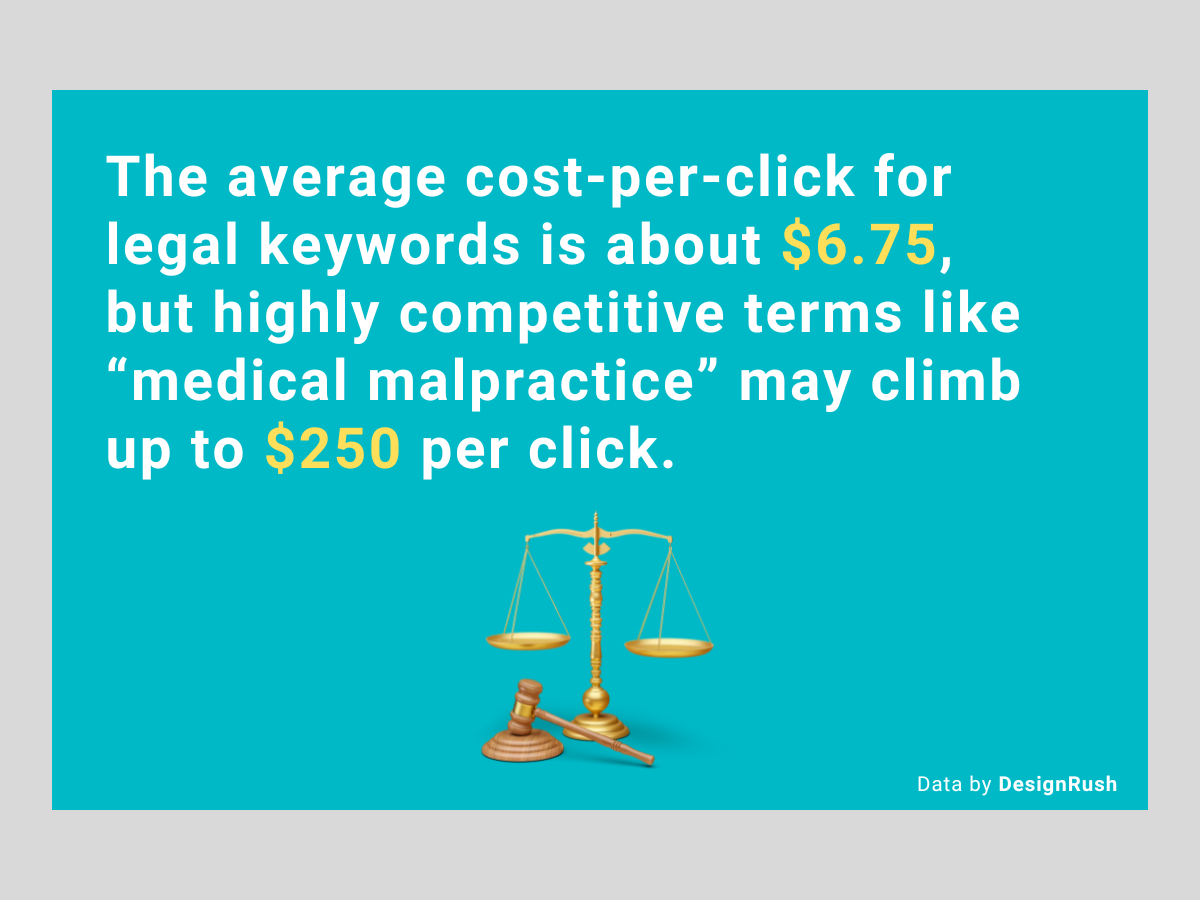
Every click must be from highly qualified users ready to hire a lawyer; otherwise, you’re literally burning money.
Proven SEO & Content Expertise
Law firm SEO services help improve your firm’s visibility and rankings in organic search results. Using targeted keywords, quality content, and local SEO strategies helps the right clients find your firm when they need legal help.
With rising competition and more clients searching online, strong SEO is critical. Having an experienced legal marketing expert by your side gives your firm the edge it needs to stand out and grow.
YMYL and EEAT
YMYL, which stands for “Your Money or Your Life,” refers to content that can directly influence a person’s health, finances, or safety. This includes medical advice, financial guidance, and legal information. Legal content is high-stakes, so it automatically falls under the YMYL category.
Because inaccurate information can have serious consequences, Google applies stricter standards for YMYL content. It evaluates credibility and quality using the E-E-A-T framework, which means Experience, Expertise, Authoritativeness, and Trustworthiness.
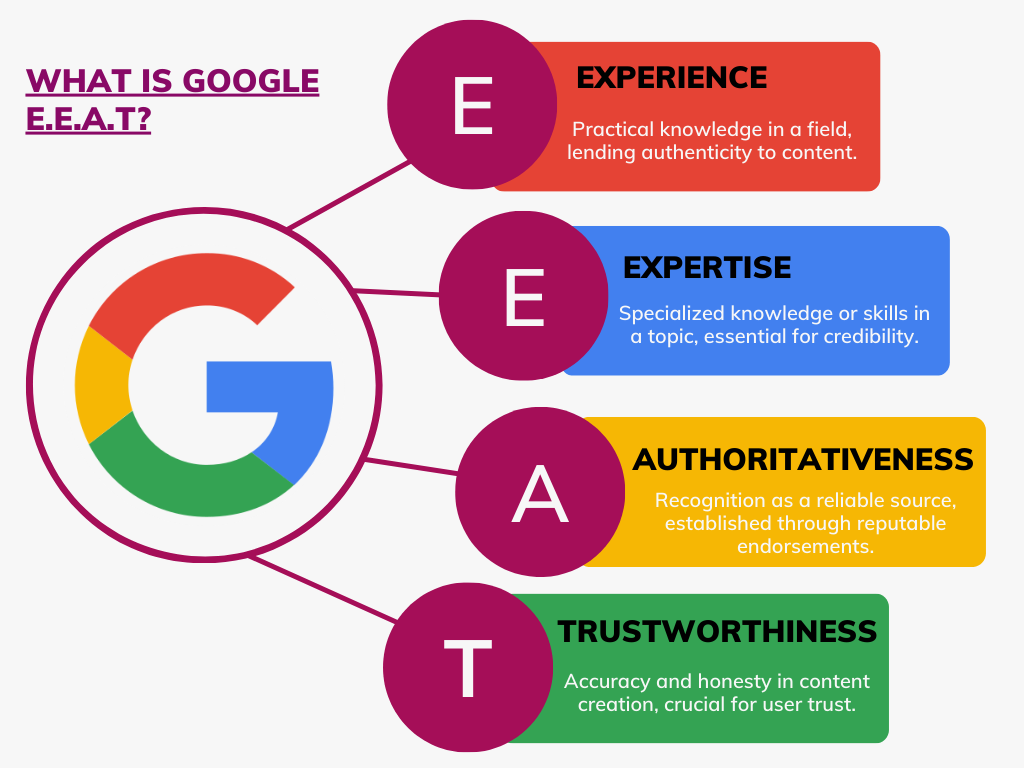
These standards are outlined in Google’s Search Quality Rater Guidelines, which are used by human evaluators to assess the accuracy, reliability, and value of content. Their feedback informs Google’s algorithms, meaning strong EEAT signals improve a law firm’s visibility, credibility, and trust online.
The Four Elements of EEAT
- Experience: Looks at whether the content creator has practical, firsthand involvement with the topic. For law firms, this can include articles or guides written or reviewed by attorneys with direct experience in the relevant legal field.
- Expertise: Highlights professional knowledge and qualifications. Displaying credentials, bar membership, and specialized practice areas demonstrates skill and authority in the subject matter.
- Authoritativeness: Focuses on reputation within the legal community. Publishing high-quality content, receiving positive client feedback, and maintaining recognition as a trusted source builds credibility.
- Trustworthiness: Measures accuracy, transparency, and reliability. Clear references, factual information, and unbiased content create confidence for both clients and search engines.
Strategies to Meet EAAT Standards
A digital agency should take the right steps to help your law firm meet EEAT standards. Below are some strategies they can apply to achieve this goal:
- Creating High-Quality Legal Content
High-quality content is essential for law firms. It must be clear, accurate, and authoritative. Strong content includes blogs, guides, FAQs, case studies, and legal insights that answer client questions and show genuine expertise. Regular updates that reflect legal changes help maintain credibility and relevance.
- Adding Schema for Better Visibility
Schema is structured data that helps search engines understand a website’s content. It can be applied to services, attorney profiles, articles, blogs, and client reviews. Proper use increases search visibility, highlights rich results, and attracts more qualified traffic.
PPC Management for Legal Firms
Unlike organic SEO traffic, pay-per-click (PPC) is a paid advertising method that places your law firm at the top of search results. Your firm bids on specific keywords and pays only when a user clicks an ad. PPC offers a cost-effective way to attract qualified leads actively seeking legal help.
With platforms like Google Ads, law firms can target clients by practice area, location, and demographics. A trusted digital marketing agency can manage keyword bids, craft strong ad copy, and optimize campaigns to deliver the ROI.
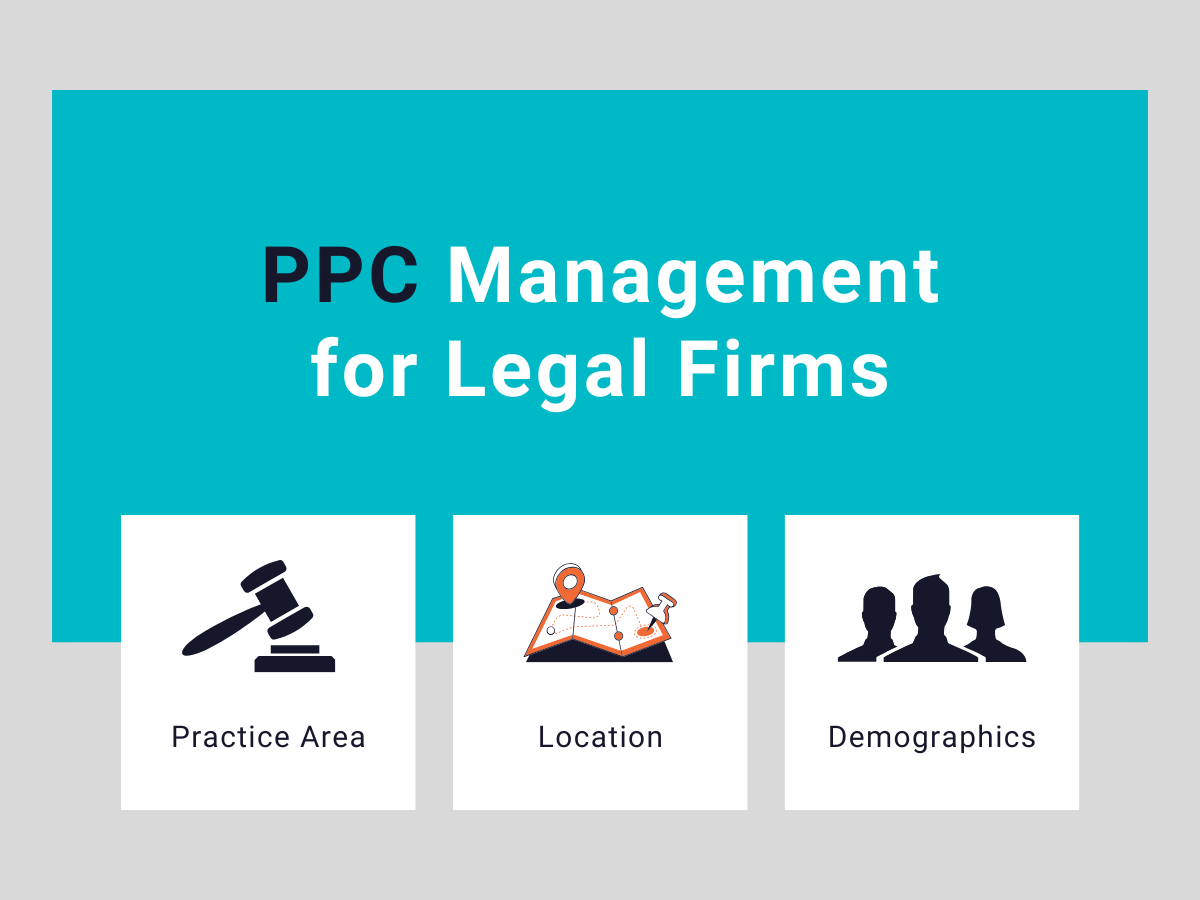
Using Negative Keywords
When running Google Ads for law firms, it’s important to target only relevant keywords. Negative keywords help with this by preventing your ad from appearing in unrelated search results. These are terms that aren’t relevant to your law firm’s services.
For example, if you want to rank for “Philadelphia law firm” but don’t handle personal injury cases, your ad might still show for “Philadelphia law firm for personal injury.” By adding “personal injury” as a negative keyword, your ad won’t appear in those searches.
Creating Compliant Ad Copy
Marketing agencies must comply with strict ethical and legal advertising guidelines, including those for PPC campaigns. To avoid penalties or disciplinary actions, they must create ads that are honest, transparent, and follow the advertising regulations in their jurisdiction.
Ads should not contain misleading claims, guarantees, or exaggerated statements such as “#1 lawyer“ or “top-rated firm.” Agencies should instead highlight factual details like credentials, years of experience, or approved client testimonials, and use regulated terms like “expert” only when officially authorized.
Monitoring Conversions
Conversion tracking is vital for understanding how well your PPC campaigns perform. It works by adding a small piece of code to your website that records user actions after they click your ads, such as submitting a contact form, making a phone call, or taking other actions that show interest.
The data collected reveals how visitors engage with your site and helps you identify which parts of your campaign are effective and which areas need improvement.
Managing Ad Spend
PPC marketing charges a business each time someone clicks on an ad. Cost-per-click (CPC) is the amount paid for each click. On Google Ads, average CPC ranges from $1 to $2, but in competitive industries like law, CPC can reach $50 or more. Across industries, businesses generally earn $2 in revenue for every $1 spent.
The best legal marketing firms maximize ROI through strategic keyword selection, precise audience targeting, and ongoing campaign analysis.
They allocate budgets transparently by splitting spend across high-performing keywords, geographic regions, ad variations, and retargeting campaigns. This allows law firms to see exactly how their investment converts into clients and revenue.
How to Measure PPC Campaign ROI
A skilled agency doesn’t just run ads. It measures results, optimizes spend, and proves that your investment is delivering real clients and measurable outcomes.
Here are the key financial metrics every law firm and every agency you consider should track and report on:
ROI = (Revenue – Total Costs) / Total Costs × 100
→ Measures total profitability after all campaign expenses.
ROAS = Revenue / Ad Spend
→ Shows how much revenue is generated for each dollar spent on ads (e.g., 4:1 means $4 earned for every $1 spent).
CPA = Total Ad Spend / Number of New Clients
→ Measures the cost of acquiring one new customer through advertising.
Example: Calculating ROI for a Legal PPC Campaign
Let’s say your law firm runs a PPC campaign:
- Ad Spend: $10,000
- Management + Landing Page Costs: $2,000
- Total Cost: $12,000
- Clients Gained: 3
- Revenue per Client: $15,000
Calculations:
- Total Revenue: (3 × 15,000 = $45,000)
- ROI: ((45,000 − 12,000) ÷ 12,000 × 100 = 275%)
- ROAS: (45,000/10,000 = 4.5)
- CPA: (10,000 ÷ 3 = $3,333)
Results:
- ROI: 275% — It indicates a positive return, with the campaign earning 2.75 times its total costs.
- ROAS: 4.5 — For every $1 spent on ads, the campaign generated $4.50 in revenue.
- CPA: $3,333 — The average cost to acquire one new client through the campaign.
Local SEO & GBP Strategy
Local SEO focuses on optimizing your law firm’s online presence to attract clients within your geographic area. The best digital marketing agency for legal services can help your firm appear at the top of local search results and reach clients who require immediate legal assistance.
With effective local SEO, your firm can appear in Google’s Local Pack, Google Maps, and local directories when potential clients search for terms like “ divorce lawyer near me” or “personal injury attorney in [your city].
Unlike traditional SEO, which attracts visitors from multiple countries, states, or cities, local SEO connects your firm with nearby individuals actively seeking legal help.
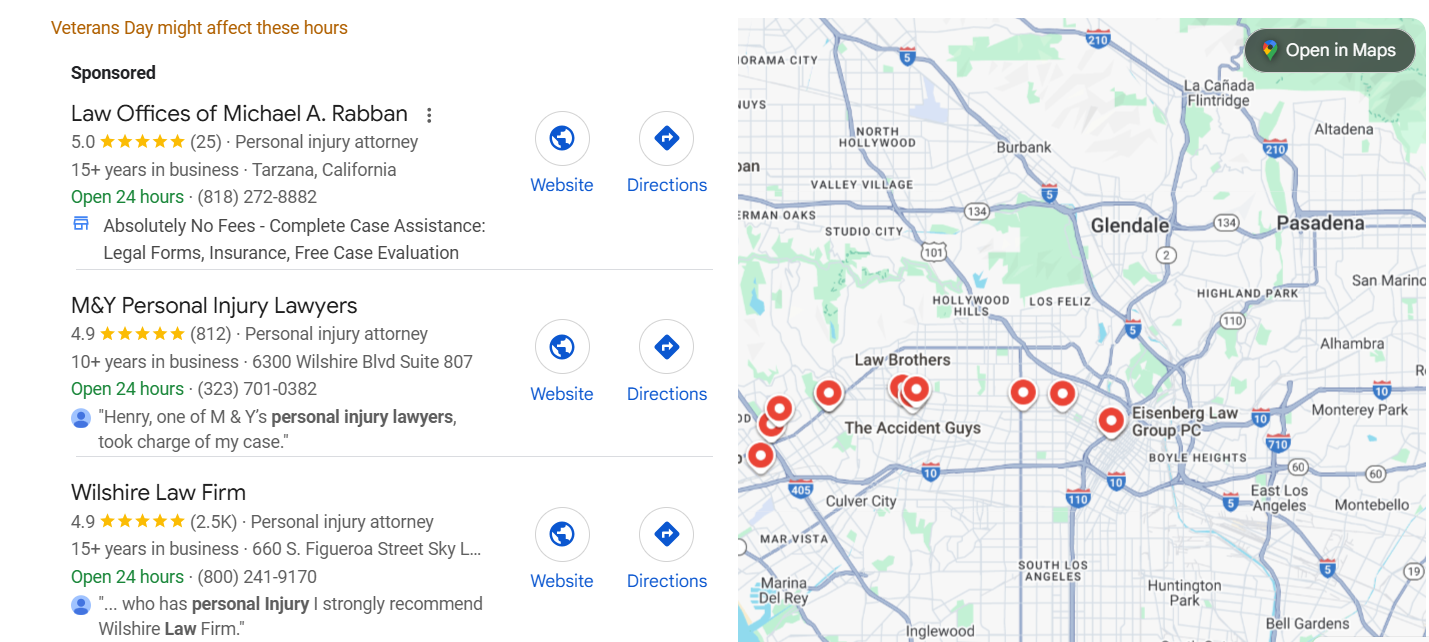
Optimizing Your Google Business Profile
Your Google Business Profile (GBP) forms a client’s first impression of your firm. It appears in Maps and the local pack, the prominent box at the top of search results. A fully optimized GBP can determine whether a client contacts your firm or a competitor.
A complete profile displays accurate business hours, detailed service descriptions, professional photos, and timely posts. Google reports that a fully optimized GBP increases the likelihood of client visits by 70%.
Common GBP Suspension Causes
Google may suspend a business profile if it detects rule violations or suspicious activity. Suspension prevents your firm from appearing in search results or Maps. Common causes of GBP suspension include:
- Over-Optimized Business Name: The profile name must match your registered business name and the name clients recognize on signage or business cards. Remove extra keywords to prevent confusion.
- Virtual Offices or Co-working Spaces as Business Addresses: Using such addresses can trigger investigations or competitor reports. Provide verifiable proof of your firm’s presence at the location if necessary.
- Prohibited Terms in Services: Do not use language that guarantees case results, promises settlements, or overstates your services. Keep descriptions factual to comply with Google’s policies and maintain credibility.
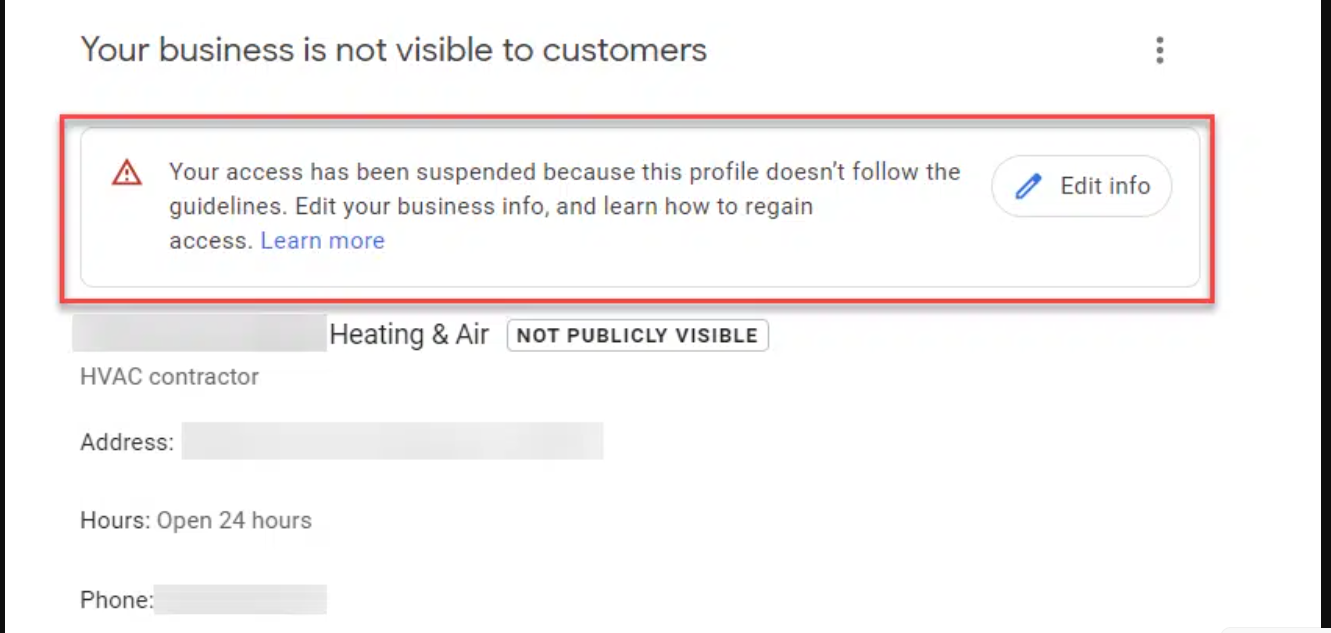
A good legal marketing company audits your GBP, corrects issues, and applies strategies that protect your visibility and prevent suspension.
Maintaining NAP Consistency
NAP stands for Name, Address, and Phone Number. These three elements must remain consistent across all online platforms. Google uses NAP information to verify your firm’s legitimacy. Inconsistent details confuse search engines and potential clients, which reduces your chances of ranking in local search results.
Managing Client Reviews Ethically
Online reviews act as a key trust signal. Studies show that 82% of potential clients read reviews before choosing a lawyer. Positive reviews boost local search visibility, increase credibility, and generate more inquiries.
Ethical review management avoids incentives, fake profiles, or misleading feedback. A competent legal marketing partner helps your firm collect genuine reviews, respond professionally to negative feedback, and maintain a strong reputation.
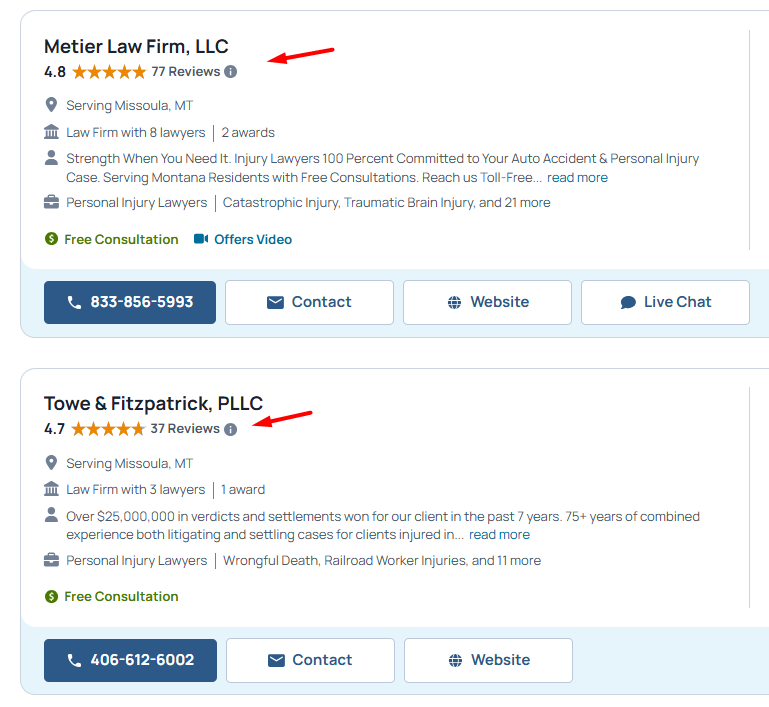
Data-Driven Transparency
Effective marketing delivers measurable results instead of surface-level numbers. A strong agency provides clear reports that link every marketing dollar to new clients and revenue. Reports include live dashboards that show performance with complete transparency.
Dashboards give law firms the ability to track spending, review lead quality, count signed cases, and evaluate revenue. They reveal which campaigns generate profit and which require adjustments. This method turns marketing from a guessing exercise into a predictable growth system. The most important metrics to track are:
- Cost Per Qualified Lead (CPQL): The amount spent to acquire a lead who fits the ideal client profile.
- Cost Per Signed Case (CPSC): The total marketing cost needed to convert a qualified lead into a paying client.
- Marketing Return on Investment (ROI): The revenue produced for each dollar spent, which shows the true financial impact of marketing.
Reputation & Client Feedback
Client reviews provide a clear picture of an agency’s true performance. Patterns in authentic feedback on Clutch, Google Reviews, or verified testimonials reveal consistent results, transparency, and professionalism.
Agencies with repeated, genuine praise deliver measurable growth, build trust, and handle complex law firm marketing challenges. They give you confidence that every marketing dollar brings value.
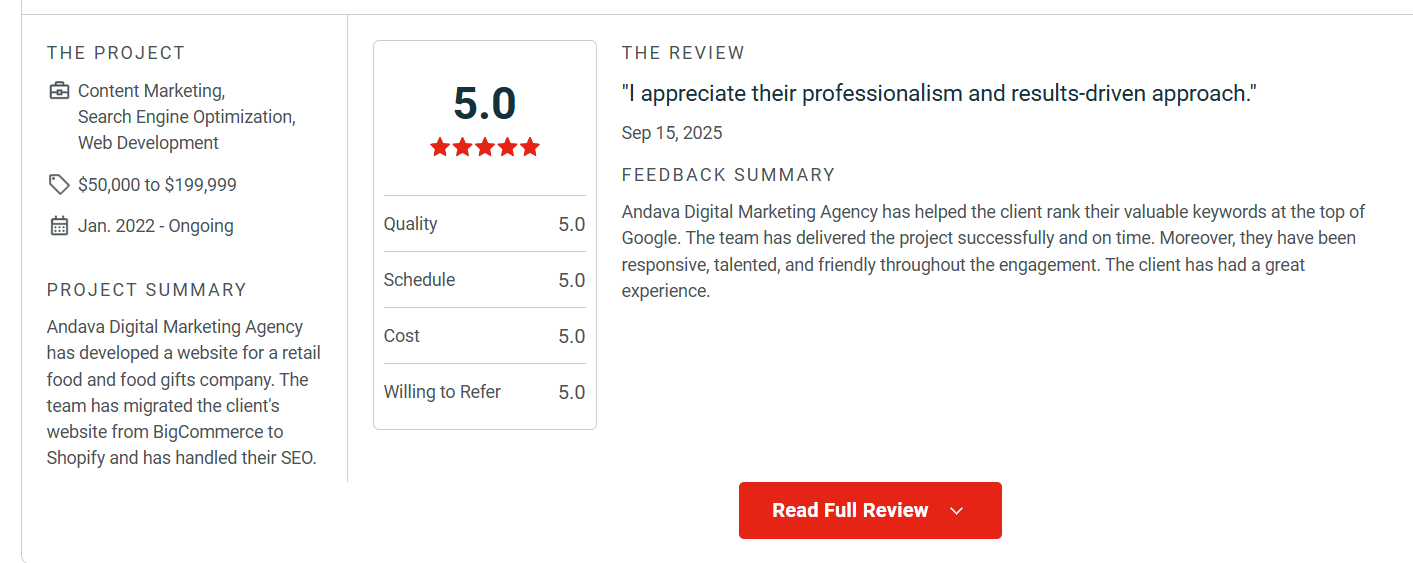
The right digital marketing agency for your law firm combines legal industry expertise, ethical compliance, and precision-targeted online advertising to attract high-value clients without wasting budget. By mastering SEO, PPC, local search, and reputation management, they turn every marketing dollar into measurable growth, trust, and long-term credibility.
Key Factors to Consider When Evaluating Agencies
Here’s what to keep in mind when assessing potential marketing agencies to make a smart choice that fuels your law firm’s growth:
- Firm Size: Boutique agencies provide highly specialized strategies and individualized attention for law firm digital marketing. They focus on specific practice areas. Full-service agencies handle broader campaigns across multiple channels. They offer integrated solutions but potentially less niche expertise.
- Experience with Your Specific Practice Areas: A top-notch marketing partner familiar with your legal niche understands regulatory requirements, high-CPC keywords, and sensitive messaging.
- Service Range: Agencies with a full service range can coordinate SEO, PPC, content creation, web design, and analytics for cohesive campaigns. Integrated services maintain consistent messaging, improve search visibility, track performance effectively, and provide insights into what drives leads and conversions across multiple marketing channels.
- Budget Alignment: Proper budget allocation enables law firms to remain competitive in search advertising, capture quality leads, and avoid overspending on low-performing keywords.
- Communication & Reporting Style: Clear updates, dashboards, and data summaries allow quick strategic adjustments and informed decisions.
- Tools & Technology Stack: The best digital marketing agency for law firms uses advanced tools to capture leads, track calls, measure conversions, and integrate with CRMs. GA4 analytics and automation improve monitoring, reporting, and optimization.
When evaluating agencies, consider firm size, niche expertise, service breadth, budget focus, communication, and technology, as each shapes how campaigns perform and leads convert. Together, these factors reveal an agency’s ability to drive measurable growth for your law firm.
Legal Marketing Compliance Checklist
Marketing a law firm requires strict attention to ethics and legal standards. Follow these guidelines to keep advertising, online profiles, and promotional materials professional, credible, and compliant.
- Avoid restricted terms like “rape,” “abuse,” or “domestic violence” in profiles. Use neutral, professional language to protect your firm’s credibility.
- Do not claim “#1,” “guaranteed results,” or “win rate.” Such statements mislead clients and violate advertising rules.
- Add disclaimers for case results. State that past outcomes do not predict future success and protect your firm legally.
- Keep verified physical business addresses. Do not use virtual offices or PO boxes to maintain trust and local search performance.
- Review Google’s sensitive content and advertising policies regularly. Follow rules to maintain compliance and prevent account penalties.
Ethical, compliant marketing safeguards your firm, builds lasting client trust, and projects credibility, professionalism, and integrity in every communication and interaction.
Red Flags When Choosing a Marketing Agency
Finding the right marketing partner for your firm can be challenging. Choose an agency that fits your style, communicates well, and delivers measurable results. Pay attention to warning signs early to avoid working with a company that is not the right fit.
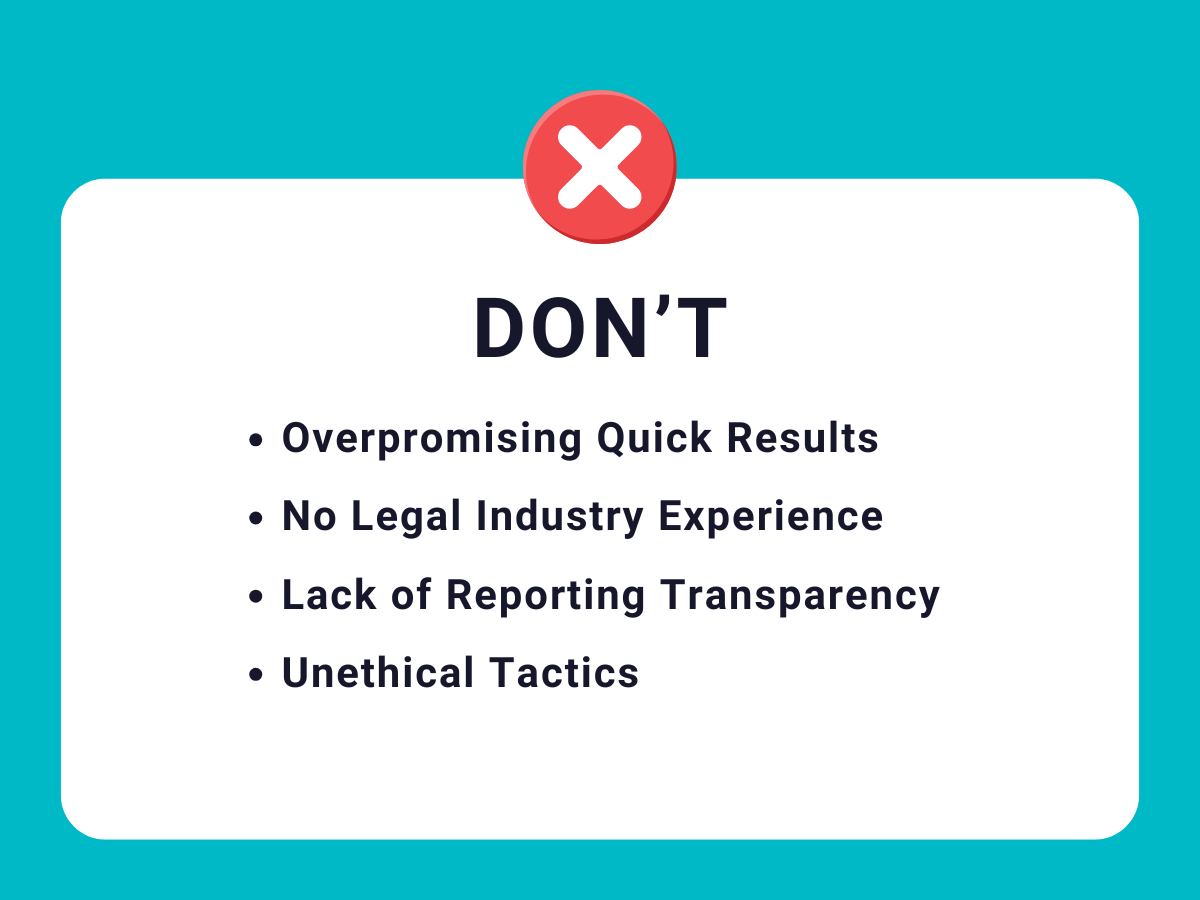
Overpromising Quick Results
Beware of agencies that promise instant viral success or ten times more leads without first reviewing your data or market conditions. Real marketing success comes from consistent and targeted strategies, not flashy shortcuts.
Reputable marketing agencies for law firms focus on timelines, testing, optimization, and proven results rather than unrealistic promises.
No Experience in Law or Regulated Industries
Legal marketing is unlike promoting retail or restaurant businesses, with stricter regulations, specialized clients, and higher stakes.
Agencies that cannot provide verifiable law firm campaign examples, measurable results, or client testimonials may lack the necessary expertise. Always request detailed case studies or references before partnering with any provider.
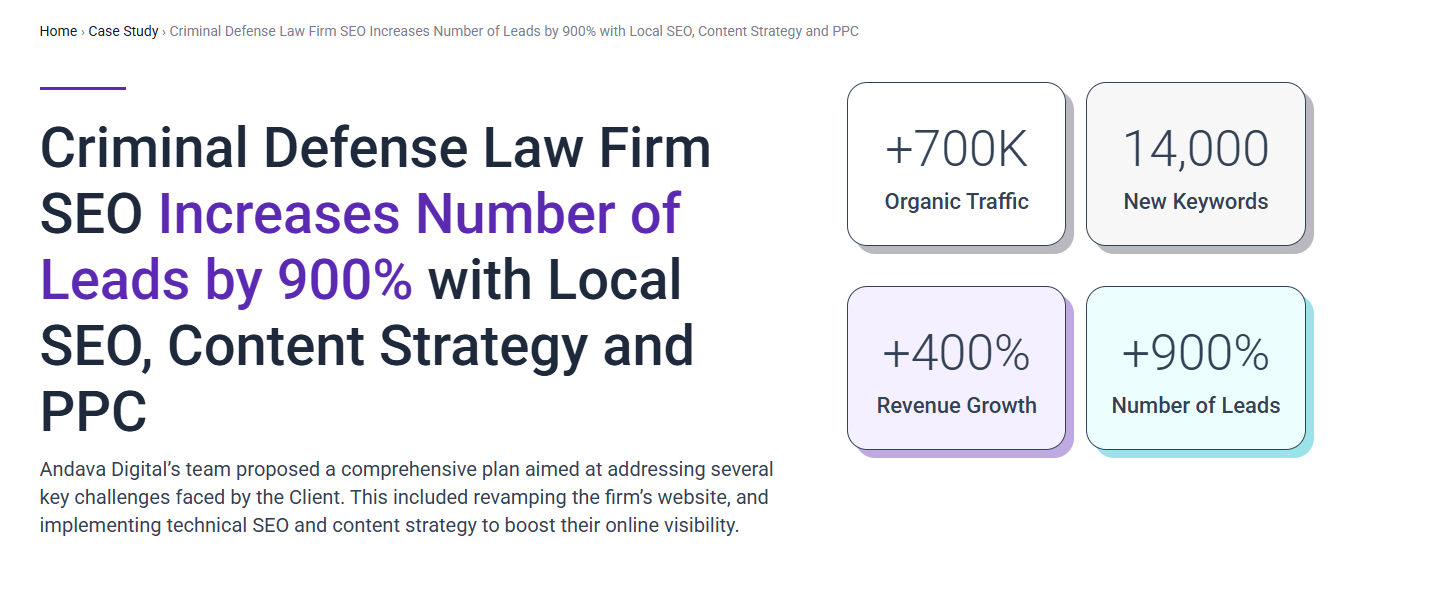
Lack of Reporting Transparency
Open communication is vital for successful legal marketing. Agencies delivering unclear or irregular reports are warning signs. Reliable providers use tools like SEMrush, Ahrefs, and Google Analytics to offer actionable insights on traffic, keyword rankings, and website performance.
Reports should be consistent, highlight campaign progress, explain any changes, and provide clear recommendations.
Using Unethical Tactics
Be cautious of agencies that use Black Hat SEO, which involves unethical methods to manipulate search rankings, including fake reviews, keyword-stuffed pages, and low-quality link schemes. A good marketing agency achieves results through strategy, transparency, and integrity, not quick fixes. Agencies that lack experience, clarity, or ethical practices often cause more harm than good.
Final Thoughts
The “best” marketing agency isn’t simply the biggest or most popular. It’s the one that truly aligns with your firm’s size, ethics, and long-term goals. Before bringing any agency on board, evaluate your current marketing performance to identify what’s working and where improvement is needed.
Choose a partner that understands legal compliance, values creativity, and delivers measurable ROI. When your agency shares your vision and operates with integrity, your firm can achieve sustainable growth while maintaining the professionalism and trust your clients expect.
FAQs
What Makes a Marketing Agency the Best for Law Firms?
Deep legal industry specialization, proven track record, and a transparent, data-driven approach make an agency the best choice for law firms.
How Much Should Law Firms Spend on Digital Marketing?
Your digital marketing budget should align with your practice area, firm size, and pricing model. The main goal is achieving a positive return on investment. For example, if your average client brings in $3,000, your cost to acquire one through marketing should be well below that.
What Are the Common GBP Suspension Reasons for Law Firms?
Inaccuracies in the business name, using an improper address, and engaging in “spammy” tactics like keyword stuffing are common reasons for GBP suspensions.
How to Track ROI From Legal PPC Campaigns?
Start by calculating your total costs, including ad spend, agency fees, and any operational expenses. Then, track revenue generated from campaigns using conversion tracking and lead attribution. Finally, calculate ROI using this formula:
ROI = ((Revenue - Cost) / Cost) × 100
Is AI-Driven Content Safe for Legal Websites?
AI-driven content can be powerful but isn’t inherently safe. Without strong human oversight, it poses legal and ethical risks. The responsibility for inaccuracies or ethical violations always falls on the law firm, not the AI tool.